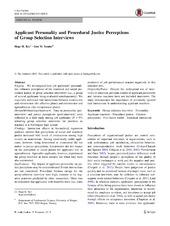| dc.contributor.author | Bye, Hege Høivik | |
| dc.contributor.author | Sandal, Gro Mjeldheim | |
| dc.date.accessioned | 2016-02-22T14:05:20Z | |
| dc.date.available | 2016-02-22T14:05:20Z | |
| dc.date.issued | 2015 | |
| dc.Published | Journal of business and psychology 2015 | eng |
| dc.identifier.issn | 0889-3268 | |
| dc.identifier.uri | https://hdl.handle.net/1956/11241 | |
| dc.description.abstract | Purpose: We investigated how job applicants’ personalities influence perceptions of the structural and social procedural justice of group selection interviews (i.e., a group of several applicants being evaluated simultaneously). We especially addressed trait interactions between neuroticism and extraversion (the affective plane) and extraversion and agreeableness (the interpersonal plane). Design/Methodology/Approach: Data on personality (pre-interview) and justice perceptions (post-interview) were collected in a field study among job applicants (N = 97) attending group selection interviews for positions as teachers in a Norwegian high school. Findings: Interaction effects in hierarchical regression analyses showed that perceptions of social and structural justice increased with levels of extraversion among high scorers on neuroticism. Among emotionally stable applicants, however, being introverted or extraverted did not matter to justice perceptions. Extraversion did not impact on the perception of social justice for applicants low in agreeableness. Agreeable applicants, however, experienced the group interview as more socially fair when they were also extraverted. Implications: The impact of applicant personality on justice perceptions may be underestimated if traits interactions are not considered. Procedural fairness ratings for the group selection interview were high, contrary to the negative reactions predicted by other researchers. There was no indication that applicants with desirable traits (i.e., traits predictive of job performance) reacted negatively to this selection tool. Originality/Value: Despite the widespread use of interviews in selection, previous studies of applicant personality and fairness reactions have not included interviews. The study demonstrates the importance of previously ignored trait interactions in understanding applicant reactions. | en_US |
| dc.language.iso | eng | eng |
| dc.publisher | Springer | eng |
| dc.rights | Attribution CC BY | eng |
| dc.rights.uri | http://creativecommons.org/licenses/by/4.0/ | eng |
| dc.subject | Group selection interview | eng |
| dc.subject | Personality Applicant reactions | eng |
| dc.subject | Procedural justice | eng |
| dc.subject | Fairness perceptions | eng |
| dc.subject | Five-factor model | eng |
| dc.subject | Statistical interaction | eng |
| dc.title | Applicant Personality and Procedural Justice Perceptions of Group Selection Interviews | eng |
| dc.type | Peer reviewed | |
| dc.type | Journal article | |
| dc.date.updated | 2016-01-04T13:37:41Z | |
| dc.description.version | publishedVersion | |
| dc.rights.holder | Copyright 2015 The Authors | eng |
| dc.identifier.doi | https://doi.org/10.1007/s10869-015-9430-9 | |
| dc.identifier.cristin | 1305373 | |

